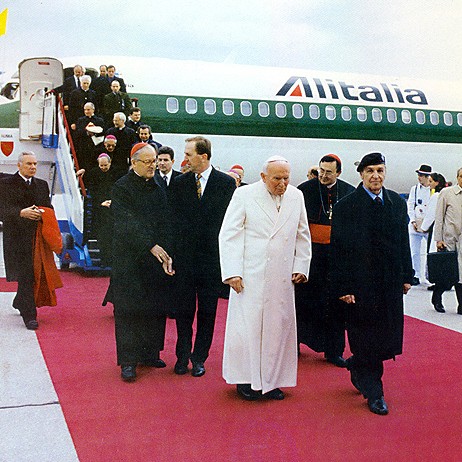"The role of Alija Izetbegović in the independence of Bosnia and Herzegovina": This photo by Amel Emrić tells about the personality of the late Alija Izetbegović, his modesty and nobility
ALIJA IZETBEGOVIĆ WAS ANTIPODE TO MACHIAVELLI (10)
Autor: Akademik prof. dr. Adamir Jerković
Objavljeno: 19. Aug 2023. 19:08:42
Adamir Jerković (Adamir Yerkovich) PhD is a Bosnian-Herzegovinian academic. He is the author of numerous political commentaries. He served as an advisor to the first President of Bosnia and Herzegovina, Alija Izetbegović. He held important political, state and economic posts. Adamir Jerković is the Secretary General of the Bosniak Academy of Sciences and Arts. He is the author of numerous books, essays, and articles.
The state known to millions of people around the world as Socialist Federative Republic of Yugoslavia – does not exist anymore. Yugoslavia burned out in a terrible fire which no one could have extinguished. On its ground, at the ashes of common state, seven new countries emerged. Among them is Bosnia and Herzegovina which revived its statehood. I am coming from Bosnia and Herzegovina and I will tell you today about difficult faith of my people who survived an exterminating war.ALIJA IZETBEGOVIĆ WAS ANTIPODE TO MACHIAVELLI: Especially impressing was the ethical side of Izetbegović’s personality. In insensitive world his spirituality and philanthropy were without a match. The world recognized him as an honorable leader, who could find and keep, in the mud of the world’s politics, virtue of humanity.
Alija Izetbegović was a charismatic person, convincing when explaining, suggestive when narrating. He was man of the middle, moderate in everything, joy and grief, winning or losing, praising or criticizing. Alija Izetbegović was a unique knight in politics, unbeatable gentleman especially in the moment of victory, because he never enjoyed in defeat of the opponent, and never triumphed when everybody expected outburst of emotions. Izetbegović was antipode to Machiavelli[1]. He despised force and bullies, his spirit cried for freedom. For him the aim did not justify the means. He didn’t know how to hate, not even his great adversaries who only brought him harm. Alija Izetbegović was a Socrates from Plato’s Dialogue “Gorgias” who claims that it is better to suffer evil than to commit one. Alija was convinced of this moral truth, in the same passionate manner as Socrates, even when he knew that the world due to its pragmatic and utilitarian reasons does not understand, or even when it does understand- does not recognize this truth.
That is a typical characteristic of good and great men, the ones who believe in God, who find in faith their power and clear road signs. And the president Alija Izetbegović found in Islam his inspiration and answers to all questions. In his anti-Machiavellist attitude and Gandhi-like mercy we can recognize a great divine gift, which was difficult to understand in the context of daily political practice. That is why Alija was special.
Alija Izetbegović, the first president of Bosnia and Herzegovina, welcomed the end of the war as the president of the Presidency of Bosnia and Herzegovina, after which in several turns he presided over the rotating Presidency of Bosnia and Herzegovina. He withdrew from active politics in the half of his mandate on October 14, 2000 and three years later, in October 2003 he passed away. Over 150 thousand of citizens of Bosnia and Herzegovina came to pay their last respect in his funeral in Sarajevo. He was buried, according to his wished, among his soldiers.
 Alija Izetbegović and pope John Paul II, Sarajevo, 1997 Alija Izetbegović and pope John Paul II, Sarajevo, 1997 |
Today, when I think about appearance of Alija Izetbegović in the political scene and his work, I am more and more convinced that you, as foreigners, better understood him and respected him than we did. But, if that can be of any comfort it should be noted that history is full of such examples.
And to conclude.
Bosniaks-Muslims are facing a very difficult choice today of which path to take further. My country, Bosnia and Herzegovina still has not exited the whirl of temptation. We are still faced with aggressive Serbian and latent Croatian separatism. They are all dreaming the old dreams and waiting for a new historical opportunity. A secessionist genie is freed from a Dayton bottle that was supposed to imprison forever Serbian destructive project, without any serious reaction from international community. Unfortunately, Bosniak leaders are too preoccupied with own vanity and nonexistence of any Bosniaks’ national program to be able to respond in a right manner to these challenges. In the recent past, Bosniaks lead by Alija Izetbegović knew how to choose a right path among multitudes of the wrong ones.
Today, Bosniaks miss Alija Izetbegović dearly, miss his wisdom, statesman maturity and political vision. His work could be an excellent orientation point to the new generation of Bosniak politicians as how to respond to temptations of time, and especially how to resist aggressive separatism which endangers integrity of the state today. Of course, if they are willing to learn from the lessons of the past.
FOOTNOTE:
1] Niccolò di Bernardo dei Machiavelli (1469 –1527), was an Italian diplomat, author, philosopher and historian who lived during the Renaissance.The term Machiavellian often connotes political deceit, deviousness, and realpolitik.
